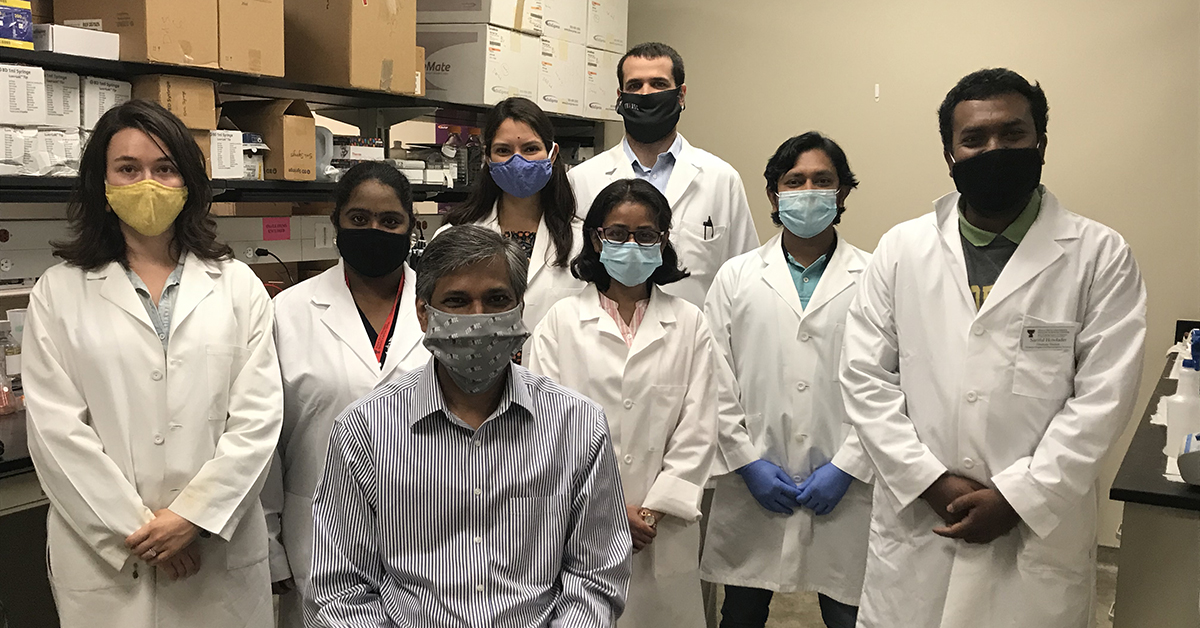TTUHSC Scientist Takes Next Step in Search for Bone Disease Treatment
Das Study Indicates KLF2 Induction In DPSCs Can Promote Osteoblast

For more than a decade, Hiranmoy Das, Ph.D., has been investigating how Kruppel-like Factor 2 (KLF2), a gene that codes protein into a specific human chromosome, influences the development of bone and musculoskeletal diseases such as rheumatoid arthritis and osteoporosis.
In 2006, Das, a professor in the Department of Pharmaceutical Sciences at the Texas Tech University Health Sciences Center (TTUHSC) Jerry H. Hodge School of Pharmacy, was the first to publish research in the peer-reviewed scientific journal, Proceedings of the National Academy of Sciences, U.S.A., showing KLF2 regulates monocyte activation and function. Monocytes, the largest type of white blood cells in our immune system, help defend the human body from bacteria, viruses and fungi. His past research also has demonstrated that low levels of KLF2 promote osteoclast, a specialized cell that helps in the bone degradation process, a key factor in developing bone and musculoskeletal diseases as the body ages.
Homeostasis, a process by which new bone is built and old bone is removed, is maintained by two important cells: osteoclasts, which decrease bone levels by removing damaged bone; and osteoblasts, which form new bone. Through a process known as osteoblast differentiation, mesenchymal stem cells, which are found in bone marrow and fat, acquire the bone building characteristics of osteoblasts.
Most recently, the Das lab attempted to determine if inducing KLF2 levels in dental pulp derived stem cells (DPSCs) will promote osteoblast and the building of new bone. Their study, “KLF2 regulates dental pulp-derived stem cell differentiation through the induction of mitophagy and altering mitochondrial metabolism,” was published in the September issue of Redox Biology. His team included TTUHSC research associates Jyotirindra Maity and Moonmoon Deb and research assistant Carl Greene.
Das said his team used DPSCs in their latest study because DPSCs have the same characteristics as mesenchymal stem cells, which means they also can differentiate into bone building osteoblasts.
“We wanted to see what happens in the DPSCs at the KLF2 level,” Das explained. “To our surprise, we found that during the differentiation, the KLF2 level was very highly increased.”
Das said KLF2 is known to play a protective role in certain aspects of human health. For instance, various statins used to treat high cholesterol also increase the KLF2 level in endothelial cells. Because endothelial cells are primarily found in arteries, veins and capillaries, increasing their KLF2 level helps protect against cardiovascular disease.
If osteoblastic differentiation can be promoted more efficiently by inducing KLF2 in the DPSCs, Das believes those stem cells can be used to help reduce the occurrence and severity of rheumatoid arthritis, osteoporosis and other bone and musculoskeletal diseases not yet tested.
“Think about it: if we can induce KLF2, that will help in osteoblastic differentiation and it will inhibit osteoclastic differentiation,” Das said. “It also will help the stem cells to make more osteoblasts so they can form more bone. So basically, it is two different angles we are treating that will reduce bone related diseases such as osteoporosis, arthritis, spondyloarthritis and all kinds of diseases.”
Related Stories
Celebrating Veterans: TTUHSC’s General Martin Clay’s Legacy of Service and Leadership
From his initial enlistment in the Army National Guard 36 years ago to his leadership in military and civilian health care management roles, Major General Martin Clay’s career has been shaped by adaptability, mission focus and service to others.
Texas Tech University Health Sciences Center School of Nursing Named Best Accelerated Bachelor of Science in Nursing Program in Texas
The TTUHSC School of Nursing Accelerated Bachelor of Science in Nursing (BSN) program has been ranked the No. 1 accelerated nursing program in Texas by RegisteredNursing.org.
TTUHSC Names New Regional Dean for the School of Nursing
Louise Rice, DNP, RN, has been named regional dean of the TTUHSC School of Nursing on the Amarillo campus.
Recent Stories
National Academy of Inventors Names TTUHSC Faculty Senior Members
The National Academy of Inventors (NAI) has designated two current and one former TTUHSC faculty researchers as Senior Members.
The John Wayne Cancer Foundation Surgical Oncology Fellowship Program at Texas Tech University Health Sciences Center Announced
TTUHSC is collaborating with the John Wayne Cancer Foundation and has established the Big Cure Endowment, which supports the university’s efforts to reduce cancer incidence and increase survivability of people in rural and underserved areas.
TTUHSC Receives $1 Million Gift from Amarillo National Bank to Expand and Enhance Pediatric Care in the Panhandle
TTUHSC School of Medicine leaders accepted a $1 million philanthropic gift from Amarillo National Bank on Tuesday (Feb. 10), marking a transformational investment in pediatric care for the Texas Panhandle.
